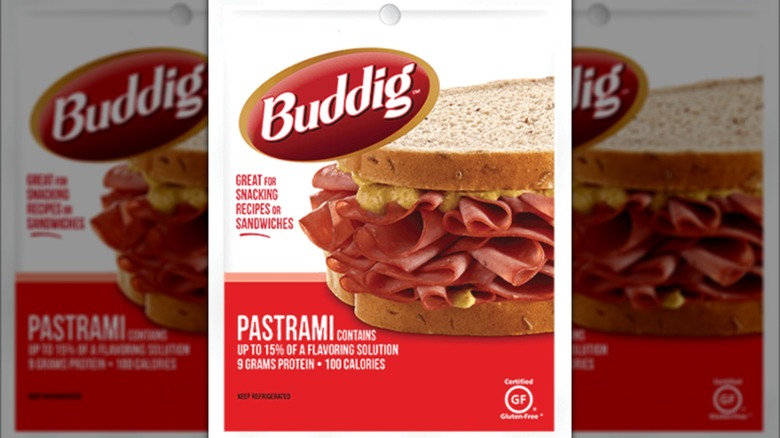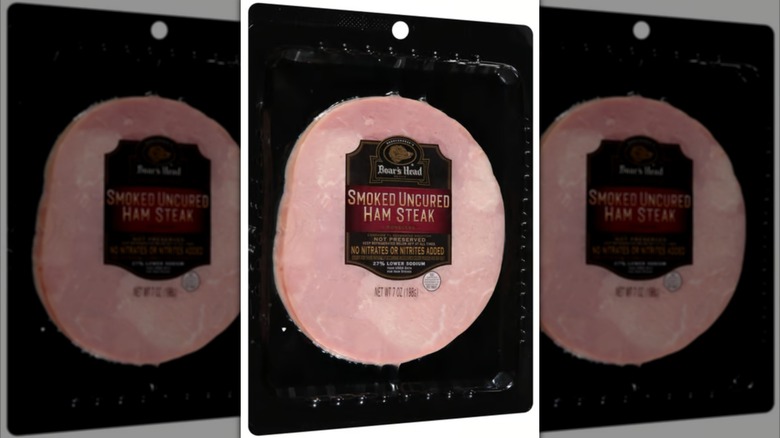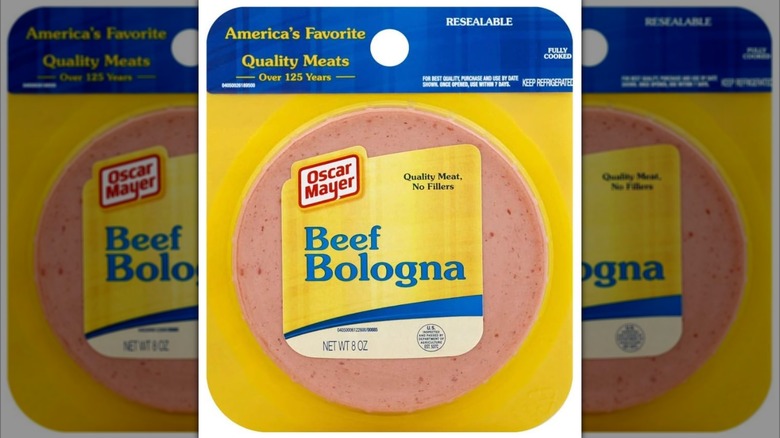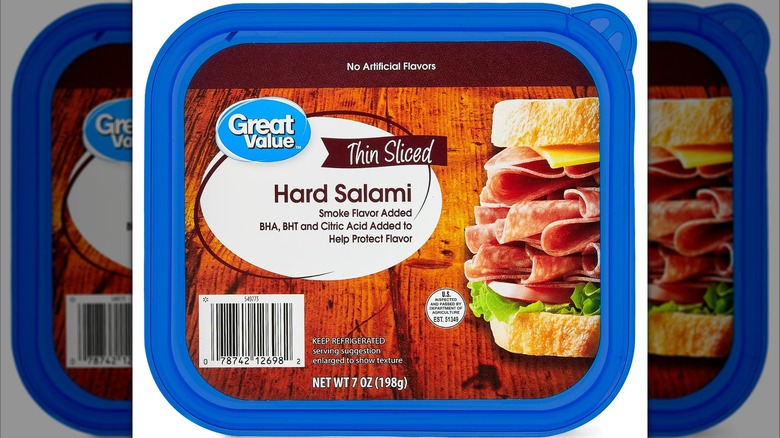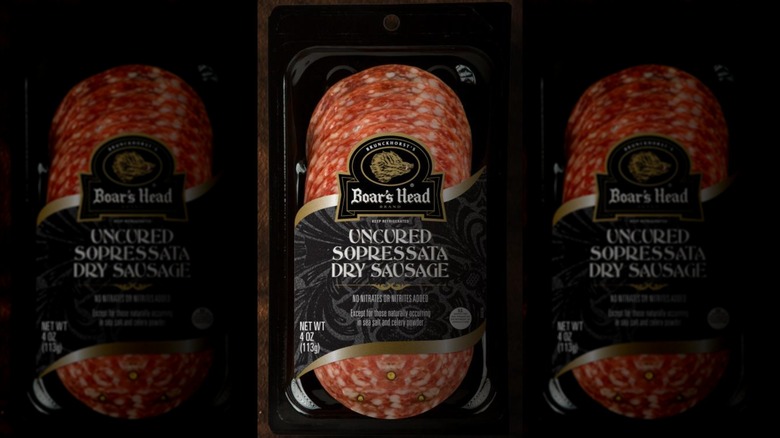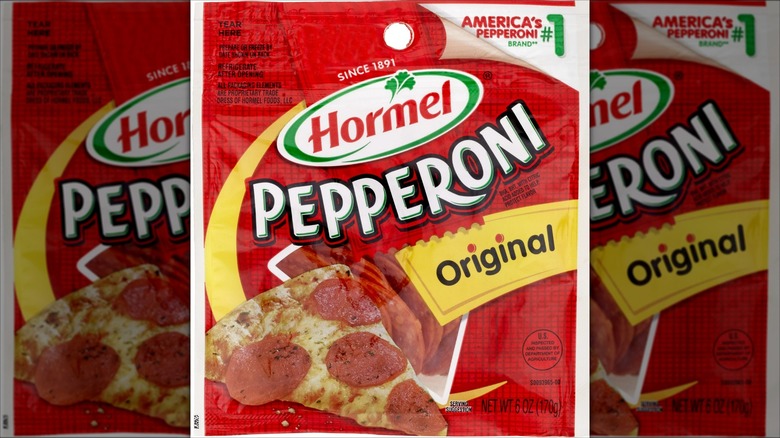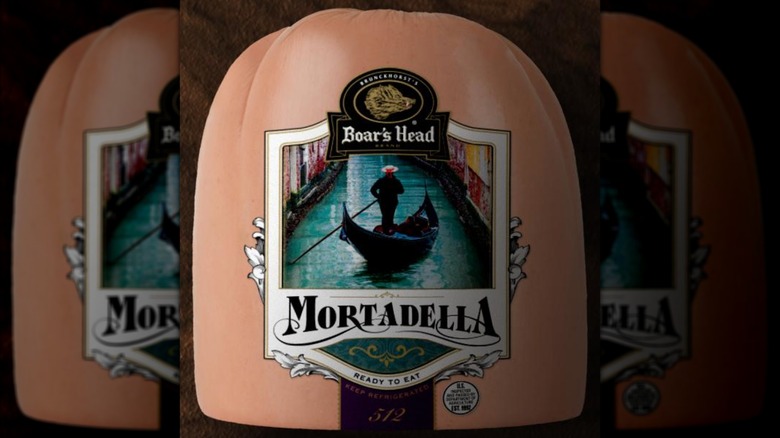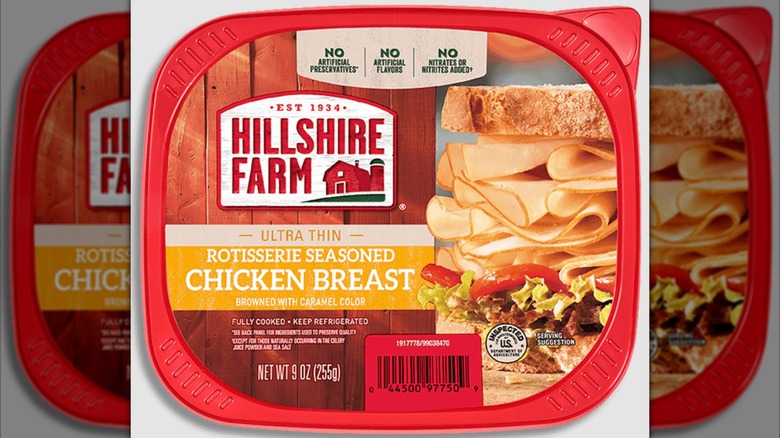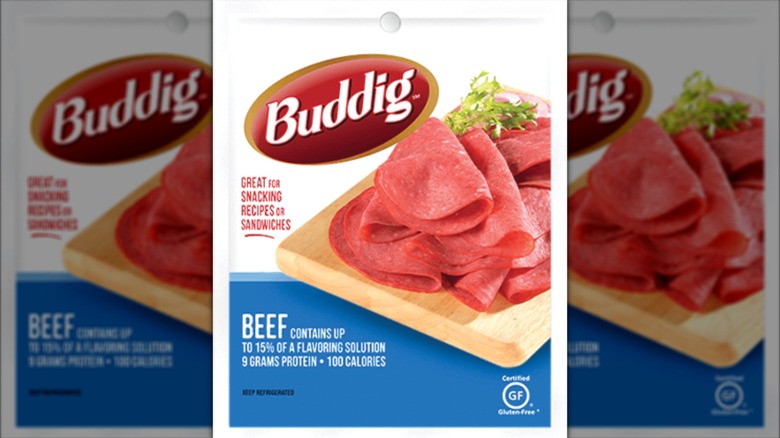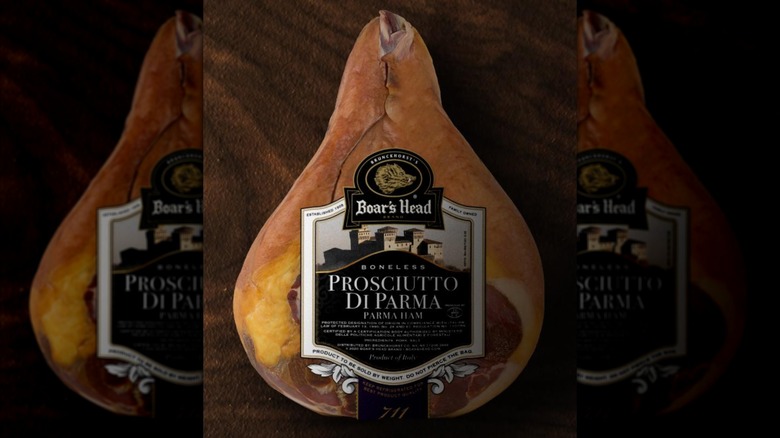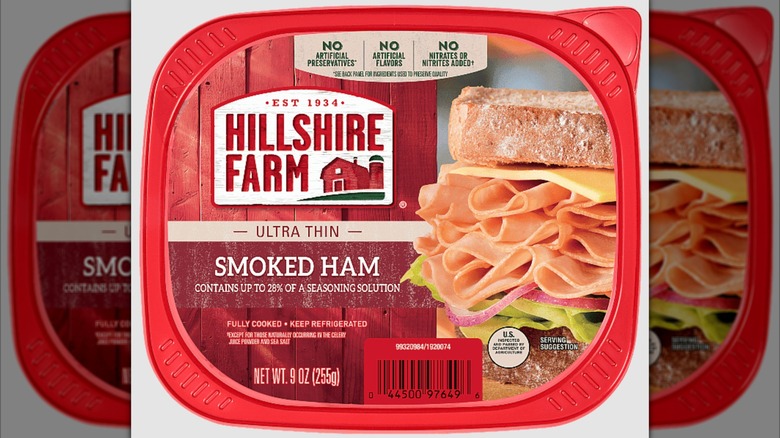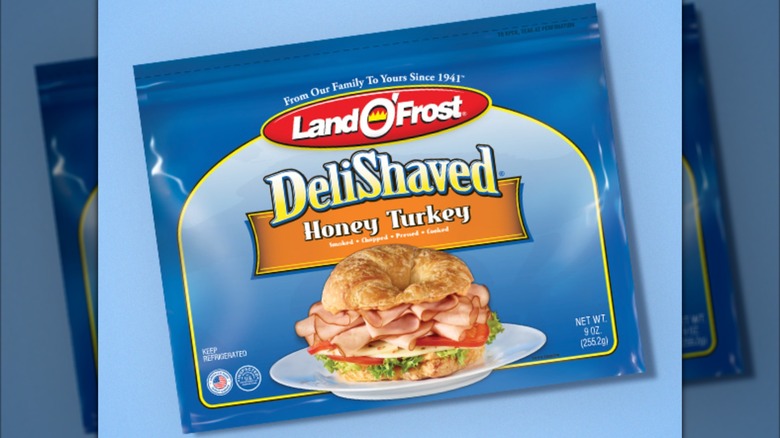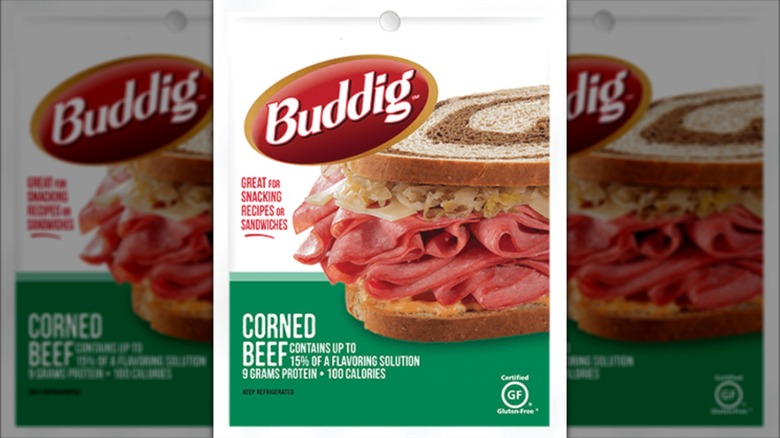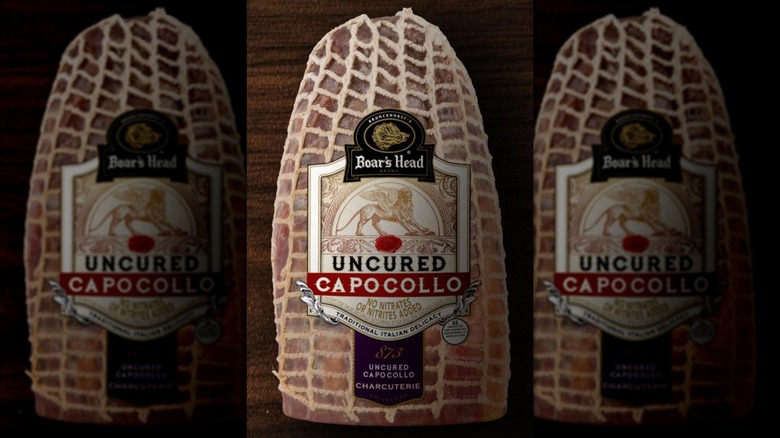14 Unhealthiest Deli Meats You Should Think Twice About Before Eating Again
We may receive a commission on purchases made from links.
Deli meat is convenient, tasty, and affordable; no wonder it's a staple item. However, it's also got a fairly poor reputation when it comes to nutrition. While the idea of deli meat seems to be a good one, it often gains its flavor and its shelf life from undergoing a curing process, which can raise its salt levels significantly. Deli meats are also frequently made with fattier cuts of meat, therefore containing pretty high saturated fat levels.
Both the salt and the saturated fat content in certain deli meats can be fairly concerning, with tiny portions covering large amounts of the 2,300 milligrams of sodium and 13 to 20 grams of saturated fat recommended by health organizations as daily values for U.S. adults. So what are you to do? Well, you can start making your own deli meat at home, but most of us don't have the time or resources to do that. A far smarter place to start is to identify the unhealthiest deli meat options out there, while also getting a sense of why these meats can be so unhealthy in the first place. In this article, we selected these options based on them being particularly high in sodium, saturated fat, or both, and looked at how specific deli meats can become so salty and fatty.
1. Buddig Pastrami
Buddig deli meat has been around for a while, and is pretty well-known to customers for its affordability. It's fair to say that it's also regarded by some as a deli meat brand that doesn't exactly radiate health. If you need any proof of this, look no further than its pastrami. Pastrami is normally pretty salty, but Buddig Pastrami pushes things to the next level. In just a 2 oz. serving, it manages to pack in 600 milligrams of sodium, 25% of your daily value. It also delivers 3 grams of saturated fat, covering 15% of the daily recommended amount.
As pastrami is made with beef brisket, a fairly fatty cut, and is highly seasoned during its production process, some saturated fat and sodium is unavoidable. However, the nutritional stats of Buddig Pastrami make it an especially unhealthy example of processed meat, which have long been known to increase the likelihood of developing colorectal cancer if consumed regularly. Buddig Pastrami also contains nitrites, which have been found to be a contributing factor to cancer development in multiple studies. Given the amount of pastrami options out there, you might want to go for a different kind.
2. Boar's Head Smoked Uncured Ham Steak
Curing is what gives many deli meats their flavor, but the salt added during it is also what can make them so unhealthy. So when you see an uncured deli meat product, it's easy to feel like you've hit the jackpot. That might be the case with Boar's Head Smoked Uncured Ham Steak, which also promises on its label that it's got 27% lower sodium than other ham steaks out there. Well, we're sorry, but that's not exactly an achievement when the sodium of the product itself is still sky high. In every serving of Boar's Head product, you get a massive 780 milligrams of sodium, 32% of your daily value.
So why is it so salty if it's an uncured product? Surely that means that it's not been processed as heavily, right? Well, not quite. Uncured meat is in fact still cured (we know, major branding issue), but instead of having nitrite-rich brine injected directly into the meat itself or being soaked in a nitrite brine, it's bathed in a nitrite-free brine and then smoked or baked. This lack of nitrites might be a good thing, but it doesn't mean that it doesn't have huge amounts of salt, which can still be a real issue.
3. Oscar Mayer Beef Bologna
You can probably tell that Oscar Mayer's Beef Bologna isn't the healthiest deli meat out there by its very look. This product, which is clearly highly processed, has an unnervingly smooth, pink-brown surface which looks a little more like paste than it does meat. As such, you're likely not expecting miracles from its nutrition, and you wouldn't be wrong. Oscar Mayer Beef Bologna has an absurdly high level of saturated fat, with 3.5 grams per single slice. Each slice is hardly massive, either, weighing in at an ounce apiece.
That means that a mere morsel of this bologna covers 18% of your recommended daily saturated fat intake. Bologna is a cured sausage product made by grinding trimmings into a fine paste before being cooked, and some bologna producers make clever use of cheaper cuts and scraps which aren't exactly nutritional powerhouses. As such, this deli meat can frequently have a high saturated fat content. However, this one is especially fat-rich, and those saturated fats may over time have a negative effect on your cholesterol levels. A saving grace of this bologna is that it has just 240 milligrams of sodium per serving, but when you consider the small serving size this isn't exactly a huge bonus.
4. Great Value Hard Salami
There aren't a lot of salami haters out there — well, when it comes to people who actually eat deli meat, that is — but certain brands might just turn you off it for good. Walmart's Great Value offering is one such brand. Great Value Hard Salami is a picture of unhealthiness, with a saturated fat and sodium content that'll leave you reeling. Each serving has 4 grams of saturated fat (20% of your daily value) and 480 milligrams of sodium (again covering 20% of the maximum you should be eating a day). Those quantities would be unhealthy enough if they were in a full meal, but Great Value's salami manages to pack these amounts into a single ounce. Oh, and it has nitrites in it too.
The fact that it's fatty and salty probably isn't any surprise. Salami is, after all, a high-fat cured sausage, with the fat providing it with a rich, deep taste. However, we would argue that there are tastier options out there that come from higher-quality sources that Walmart's budget brand — and some of those have more favorable fat levels. Applegate Natural Uncured Genoa Sliced Salami Pork, for example, has 3 grams of saturated fat per serving, a slightly lower sodium content of 420 milligrams, and no added nitrates or nitrites. A small saving, but a notable one.
5. Boar's Head Uncured Soppressata
Soppressata is a type of salami, so it's pretty hard to escape the fact that it will have some fat content. This means that even fairly reputable brands that offer soppressata will have to reckon with its saturated fat levels, as well as the fact that it's cured (and therefore has a lot of salt). Boar's Head Uncured Soppressata is a good example of this. This product has 2.5 grams of saturated fat per ounce serving, roughly 12% of your daily value, and 430 milligrams of sodium. The latter covers 18% of your daily recommended allowance, and it's a lot for a tiny amount of food.
Importantly though, what makes this fat content all the more notable is that soppressata is generally made with leaner cuts of meat, like pork shoulder or lean. As such, you'd reasonably expect a product like the one Boar's Head makes to be slightly more distinct from other salamis out there. However, given that a lot of regular salamis have 3 grams of saturated fat per serving, and some light salamis have around 1.5 grams of saturated fat, the 2.5 grams in this brand's soppressata isn't that impressive.
6. Hormel Pepperoni
You wanna know why pepperoni is so delicious? It's full of fat and salt. At least, that's the philosophy that Hormel appears to be following with its Pepperoni product. Hormel Pepperoni (which is marketed as being ready to place straight onto pizza, but which can be used in pretty much any other way) has an outlandish 6 grams of saturated fat per serving, with each serving coming in at just 30 grams. As well as this, it provides 520 milligrams of sodium.
It's not like you get a lot of protein alongside all this, either — every portion has just 5 grams, less than the amount of saturated fat on offer. It's worth pointing out that the general fat content of pepperoni is usually around 30 to 35%, but it seems that Hormel decides to go heavier on the fat here. Indeed, if you look at other pepperoni products on the market, their fat to protein ratios are way more favorable. Gallo Salame Pepperoni, for instance, has 3.5 grams of saturated fat and 6 grams of protein per serving, and also has slightly less salt at 490 milligrams per portion. Other products have similar nutritional profiles, so it feels strange to go for this nutritionally poor option.
7. Boar's Head Mortadella
Anyone who's eaten mortadella before will be well aware of its vivid pink appearance, which is flecked with white blobs of fat. A type of salami, the modern-day version of mortadella is distinctly less fatty than it used to be, but certain brands can still push the envelope. This is the case with Boar's Head Mortadella, which contains a generous amount of saturated fat per serving – 5 grams, to be precise. This quantity covers a quarter of your daily value in a relatively small portion.
All that fat gives the deli meat its rich flavor, which is further amped up by the sodium content: At 560 milligrams per serving, 23% of your daily value is covered in just a few slices. This combination of saturated fat and sodium is far from healthy, and both nutrients can have a negative effect on blood pressure. It's recommended that you try and limit the intake of both wherever possible, and prioritize unsaturated fats over saturated ones for heart health. Unfortunately, opting for this mortadella really won't help much.
8. Hillshire Farm Ultra Thin Rotisserie Chicken Breast
Chicken breast is renowned for providing all the amino acids you need to keep your body ticking along while containing barely any fats, and in its raw, unprocessed form, it has barely any sodium. Things tend to go downhill when it's turned into deli meat, though, and food manufacturers cram it with salt to give it more flavor. Hillshire Farm Ultra Thin Rotisserie Chicken Breast is one of the saltiest out there. In a single serving of this chicken breast, there's 540 milligrams of sodium – almost a quarter of your daily value. Put that between two slices of unhealthy store-bought bread and slather on some salty mayo, and you may end up consuming the majority of your recommended sodium limit in one meal.
Other deli meats are cured or formed into salty, fatty sausages, and it's easy to expect deli chicken meat to be slightly different. Unfortunately, it goes through fairly rigorous processing too. Rotisserie chicken can frequently be injected with brine or seasoned water to improve its flavor and bulk it up, but this leaves it way saltier than you'd probably like. It's always smart to seek out low-sodium chicken breast wherever possible, or just cook your own at home and season them lightly.
9. Buddig Beef
Beef gets a lot of bad press for being a fatty red meat, but there are plenty of beef cuts out there that provide lean, relatively unprocessed protein. Sadly, that isn't the case when it comes to Buddig Beef. This product more closely resembles ultra-processed pastrami than slices of a lean roast cut, and it's got the ingredients list to back up its appearance, with various additives and flavorings crammed into it. Alongside these, it's also got a hefty amount of added sodium, delivering 600 milligrams per serving — a full 25% of your daily value. As well as this, it has 3 grams of saturated fat, or 15% of the recommended daily limit.
As such, Buddig Beef is every inch the processed meat, and one to be wary of. Processed meat is associated with a higher risk of a wide range of chronic diseases, including chronic obstructive pulmonary disease. The increased risk of the latter illness is especially clear in smokers who eat higher amounts of processed meats, as a study published in The American Journal of Clinical Nutrition shows, with the nitrites in the meat potentially contributing to inflammation in the airways. We know, it kinda changes our opinion of eating processed meat too.
10. Boar's Head Prosciutto di Parma
Prosciutto is considered one of the classiest deli meats out there, and its delicate slices pack a lot of flavor into each bite. You know where all that flavor comes from? Salt. While the quality of the meat is undoubtedly a big factor with prosciutto, it's all turned up to the next level by the curing process the meat undergoes, in which it's thoroughly covered in salt and left for several weeks. As the meat cures, it absorbs much of this salt, creating the prosciutto's intense flavor.
Unfortunately, Boar's Head goes big on the salt with its prosciutto. Its Prosciutto di Parma packs an astonishing 550 milligrams of sodium into a 30-gram serving size. Eat double that amount (which is easily done), and you'll be consuming almost half of your daily recommended maximum for sodium. This deli meat also has 1.5 grams of saturated fat, which it should be said is way lower than lots of other meats out there — but it's still a fairly significant amount, given its tiny serving size. Low-sodium prosciutto can be hard to find given its traditional preparation method, but some producers like Galloni have started to make reduced-salt options that are still flavorful and high-quality.
11. Hillshire Farm Smoked Ham
Smoked ham is known for its bold flavor, which naturally comes from the smoking process that it undergoes. However, before it's smoked, it's treated much like any other deli meat and is cured with a combination of salt and spices. This curing makes the meat safe to eat, but the trade-off for this is that it's also filled with sodium, sometimes excessively so. Hillshire Farms Smoked Ham is a good example of this. Each serving has 610 milligrams of sodium, or a quarter of your daily value.
This smoked ham is also a great example of a processed meat that claims to be healthier than it actually is. Hillshire Farms is quick to point out that its smoked ham has no added nitrates or nitrites, but a closer look at the ingredients list shows the presence of celery juice powder. This addition may sound wholesome, but it is in fact a nitrate-rich ingredient that supplies these controversial additives via a healthy-sounding vehicle. As such, there's no discernible benefit to opting for this smoked ham over a different option, especially given its sodium content.
12. Land O' Frost Honey Turkey
Turkey is often criticized for lacking flavor, so honey turkey can seem like the ideal choice to combat this potential pitfall. All the healthiness of turkey meat, with some added flavor? Sign us up. Sadly, though, manufacturers who make honey turkey don't just add the sweet ingredient to it — they also add truckloads of salt in a bid to boost its taste. Land O' Frost Honey Turkey is a good example of this, and it has a slightly surprising nutritional profile. Each serving has a high 560 milligrams of sodium per serving, while also providing just 2 grams of sugar. We admire them for not cramming this turkey full of sweeteners, but that sodium content leaves much to be desired.
It's also worth checking out the saturated fat in Land O' Frost's offering. Every 2 oz. serving has 1.5 grams of the nutrient, and 5 grams of fat in total. This is a fairly moderate amount as far as deli meat is concerned, but less so when it comes to turkey, which is renowned for being super lean.
13. Buddig Corned Beef
Corned beef, like pastrami, is kinda a nutritionist's worst nightmare, folks, and options don't come much worse than the corned beef made by Buddig. Its Sliced Corned Beef Lunch Meat is as salty and fatty as it gets. Every small serving has 600 milligrams of sodium (or 25% of your daily value, for those who like percentages), and 3 grams of saturated fat, 15% of the guideline daily maximum. On top of this, it has an ingredients list that's bulging with scientific-sounding additives, and which is hardly going to give you faith in processed meat as a healthy option.
Like other deli meats, corned beef is cured, which gives it its high sodium content. The fact that it's made with brisket (which is generally pretty fatty) gives it a higher saturated fat content. Unfortunately, the salty, fat-rich nature of the beef is what gives it its appeal, but some food producers do make lower-sodium options. We can't speak to how good they are, though.
14. Boar's Head Uncured Capocollo
Capocollo (or capicola) may not have the same name recognition that deli meats like pastrami and bologna might in the United States, but it's definitely worth a taste. This dry-cured ham is made in much the same way as prosciutto, and it's known for its intense, spice-forward flavor — which is underpinned by a healthy dose of salt.
This saltiness is there even in "uncured" capocollo products, like Boar's Head's deli meat offering. Its Uncured Capocollo has 590 milligrams of sodium per serving, approximately a quarter of your daily value. Using fat-rich pork shoulder to make the capocollo also gives it a higher saturated fat content, with 2.5 grams in every portion. Bear in mind that its serving size is small, too, at just 28 grams. It can be harder to find capocollo products that are lower in fat and sodium, as the deli meat doesn't quite have the market popularity to justify it having lower-salt or lower-fat options. If you're concerned about either, it may be better to avoid capocollo entirely.

